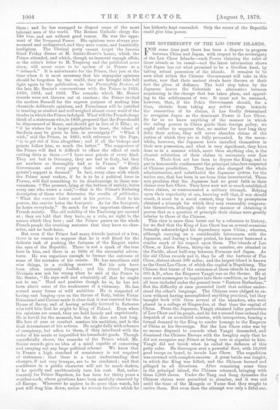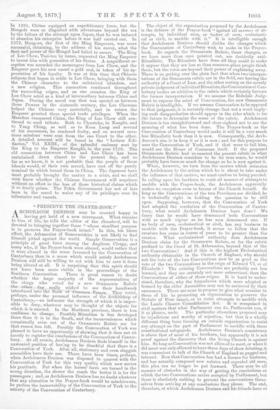THE SOVEREIGNTY OF THE LOO CHOW ISLANDS.
FOR some time past there has been a dispute in progress between China and Japan, with respect to the sovereignty of the Loo Chow Islands—each Power claiming the ruler of those islands as its vassal—and the latest information shows that Japan has cut what promised to be a Gordian knot, by taking actual possession of the islands. It remains to be seen what action the Chinese Government will take in this matter, now that their ancient rivals have thrown at their feet the glove of defiance. The bold step taken by the Japanese leaves the Celestials no alternative between acquiescing in the change that has taken place, and appeal- ing to the arbitrament of war. It must not be assumed, however, that, if the Pekin Government should, for a time, abstain from taking any active steps towards the reassertion of its claims, it has finally determined to recognise Japan as the dominant Power in Loo Chow. So far as we know anything of the manner in which the ruling powers in China guide their foreign policy, we ought rather to suppose that, no matter for how long they defer their action, they will never abandon claims of the justice of which they are so fully persuaded. In the mean- while, however, the Japanese have installed themselves in their new possession, and what is very significant, they have done so in a manner which, more than anything else, is the clearest refutation of their claims to suzerainty over Lou Chow. Their first act has been to depose the King, and to put in honourable confinement the principal islanders suspected of Chinese proclivities. They have also changed the whole administration, and substituted the Japanese system for the native one, that has been in use from time immemorial. These acts proclaim that the Japanese had no great faith in their claims over Leo Chow. They have now not so much established those claims, as consummated a military triumph. Relying upon their superiority at sea, knowing well that, if war should result, it must be a naval contest, they have by promptness obtained a triumph for which they may reasonably congratu- late themselves, although their very manner of obtaining it proves that as a question of principle their claims were greatly inferior to those of the Chinese.
This view is more than borne out by a reference to history, for we find that the King of Loo Chow has on several occasions formally acknowledged his dependency upon China ; whereas, although carrying on a considerable intercourse with the Japanese, and during a longer period, he has never bestowed a similar mark of his respect upon them. The islands of Leo Chow, or Lieou Kieou, thirty-six in number, are situated in the Pacific, about half-way between Formosa and Japan. As the old China records put it, they lie off the harbour of Foo Chow, distant about 500 miles; and the largest island is known as the Great Loo Chow, of which the capital is Napakiang. The Chinese first learnt of the existence of these islands in the year 605 A.D., when the Emperor Yangti was on the throne. He at once sent messengers to inquire into their condition, as they had all been included under the general term "Eastern Barbarians." But the difficulty at once presented itself that neither under- stood the other's language. The Chinese were obliged to re- turn without having accomplished anything practical, but they brought back with them several of the islanders, who were placed in a college at Singan-foo, at that time the capital of China. From the Japanese, Yangti obtained fuller particulars of Loo Chow and its people, and he for a second time ordered the despatch of an accredited mission, with interpreters, bearing a formal demand to the King to render homage to the Emperor of China as his Sovereign. But the Loo Chow ruler was by no means disposed to concede what Yangti demanded, and dismissed the Chinese Envoys with the haughty reply that he did not recognise any Prince as being over or superior to him. Yangti did not brook what he called the defiance of this petty ruler. He thereupon sent a powerful fleet, with 10,000 good troops on board, to invade Loo Chow. The expedition was crowned with complete success. A great battle was fought, in which the King was killed, and the Chinese burned and pillaged in all directions. After remaining some time in the principal island, the Chinese returned, bringing with them 5,000 slaves. Under the Tang and Song dynasties the Chinese claims were permitted to slumber, and it was not until the time of the Mongols or Yuens that they sought to revive them. But even then the attempt was only a fitful one. In 1291, Chitsu equipped an expeditionary force, but the Mongols were so disgusted with adventures beyond the sea by the failure of the attempt upon Japan, that he was induced to abandon his enterprise before it was half carried out. In 1372, Hong-on, the first of the Ming Emperors, was more successful, obtaining, by the address of his envoy, what the fleet and power of the Mongol had failed to secure. The King of Loo Chow, Tsai-tou by name, requested the Ming Emperor to invest him with possession of his States. A magnificent re- ception was accorded the messengers from Loo Chow, and the Emperor gave his new vassal a gold seal, in token of his ap- preciation of his loyalty. It was at this time that Chinese subjects first began to settle in Loo Chow, bringing with them the Chinese character to the unlettered islanders, and a new religion. This connection continued throughout the succeeding reigns, and on one occasion the King of Loo Chow acted as a kind of intermediary between China and Japan. During the naval war that was carried on between those Powers in the sixteenth century, the Loo Chowans helped the Chinese very materially, and in return the Emperor granted them special trade privileges. When the Manchus conquered China, the King of Loo Chow still con- tinued to send tribute. Both to Chuntche, to Kanghi, and to Yung Ching, as well as to Keen Lung and several of his successors, he rendered fealty, and on several occa- sions missions were sent from the one Court to the other. A detailed account will be found in the " Lettres Edi- fiantes," Vol. XXIII., of the splendid embassy sent by the King to the Emperor Kanghi, in the year 1719. The old connection between China and Loo Chow has been maintained down almost to the present day, and so far as we know, it is not probable that the people of those islands would, of their own accord, have cast off the purely nominal tie which bound them to China. The Japanese have most probably brought the matter to a crisis, and we shall soon know whether the Chinese Government will acquiesce without an effort in the loss of those historical claims which it so dearly prizes. The Pekin Government has not of late been in the mood to waive any of its privileges over its tributaries and vassals.



































 Previous page
Previous page